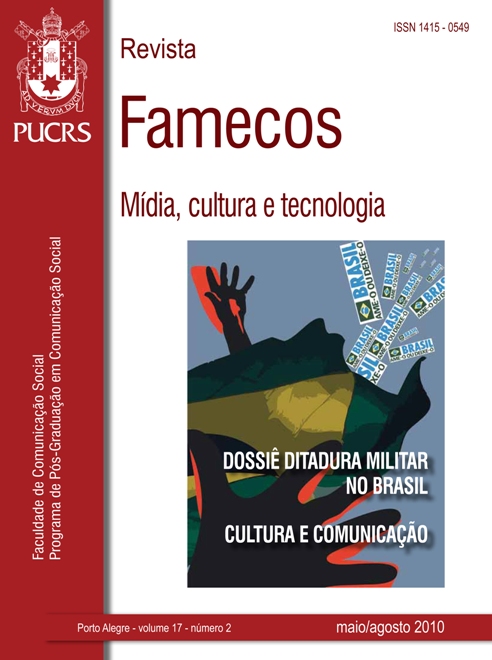Film representations of a violent police institution: traces of Military dictatorship in Elite Squad
DOI:
https://doi.org/10.15448/1980-3729.2010.2.7542Keywords:
Police institutions, Dictatorship, representationsAbstract
The aim of this work is to investigate how film representations of violence and symbolic oppression evidence the tensions between police and drug traffickers in actions performed to fight crime in Brazilian slums. A recent Brazilian movie, Elite Squad (2007) shows that Representações fílmicas de uma instituição policial violenta: resquícios da ditadura militar em Tropa de Elite both police officers and criminals use methods of torture to obtain confessions or to take revenge. We argue that the brutality that drives the relationship among police officers, slum citizens and drug traffickers reaffirms naturalized symbolic oppression patterns that were used in the period of military Dictatorship in Brazil. The violation of human rights shows that in spite of the differences among various forms of Brazilian police organizations, the mistreatment given by police to poor and marginalized citizens shows something they have in common: power abuse and physical aggression as the only way to eliminate an enemy. Our analysis is based on a “diagnostic criticism of culture” (Kellner, 2001) which mainly emphasizes: a) the social horizon of the movie and b) its discursive field (analysis of the message and visual resources).Downloads
References
BARROS, Jorge. Antonio. A história do homem que criou o BOPE e hoje prega a paz. O Globo, 20 out. 2007.
BALESTRERI Ricardo. B. Direitos Humanos: Coisa de Polícia. Passo Fundo: Paster, 1998.
HENRIQUES, Márcio. S. Polícia que conversa: reciprocidade, publicidade e accountability na implantação da filosofia de polícia comunitária, Revista Famecos, Porto Alegre, v. 36, p. 40-47, 2008.
HONNETH, Axel. Recognition or redistribution? Changing perspectives on the moral order of society, Theory, Culture & Society, Nottingham, v.18, n. 2-3, p. 43-55, 2001.
KELLNER, Douglas. A Cultura da Mídia. São Paulo: Edusc, 2001.
NEME, Cristina & CUBAS, Viviane. Elite da Tropa. Estudos Avançado,. São Paulo, v. 20, n. 58, p. 323-328, 2006.
PRYSTHON, Ângela. F. Os conceitos de subalternidade e periferia nos estudos do cinema brasileiro. In: CAPARELLI, Sérgio; SODRÉ, Muniz; SQUIRRA, Sebastião (Org.). A comunicação revisitada. Porto Alegre: Sulina, 2005.
REIS, Carlos; LOPES, Ana Cristina. Dicionário de Teoria Narrativa. São Paulo: Ática, 1988.
RONDELLI, Elizabeth. Mídia e Violência: ação testemunhal, práticas discursivas, sentidos sociais e alteridade. Comunicação & Política, Rio de Janeiro, v. IV, n. 3, p. 141-160, 1997.
ROSSINI, Miriam. Favelas e favelados: a representação da marginalidade urbana no cinema brasileiro, Revista Famecos, Porto Alegre, n. 10, p. 29-34, nov. 2003.
SANTOS, José. Vicente. Tavares. A arma e a flor: formação da organização policial, consenso e violência. Tempo Social, Rev. Sociol. USP, São Paulo, v. 9, n. 1, p. 155-167, mai. 1997.
SAPORI, Luis. Flávio.; SOUZA, Barnabé Silas. Violência policial e cultura militar: aspectos teóricos e empíricos. Teoria & Sociedade, Belo Horizonte, n. 7, p. 173-214, 2001.
SOUSA, Ana. Paula. Herói Torturador. Revista Carta Capital, n. 465, 10 out. 2007.
SOUZA, Elenice. Organização policial e os desafios da democracia, Teoria & Sociedade, Belo Horizonte, n. 7, p.151-172, 2001.
VANOYE, Francis; GOLIOT-LÉTÉ, Anne. Ensaio sobre a análise fílmica. 4. ed. Campinas: Papirus, 2006.
Downloads
How to Cite
Issue
Section
License
Copyright
The submission of originals to Revista Famecos implies the transfer by the authors of the right for publication. Authors retain copyright and grant the journal right of first publication. If the authors wish to include the same data into another publication, they must cite Revista Famecos as the site of original publication.
Creative Commons License
Except where otherwise specified, material published in this journal is licensed under a Creative Commons Attribution 4.0 International license, which allows unrestricted use, distribution and reproduction in any medium, provided the original publication is correctly cited.






